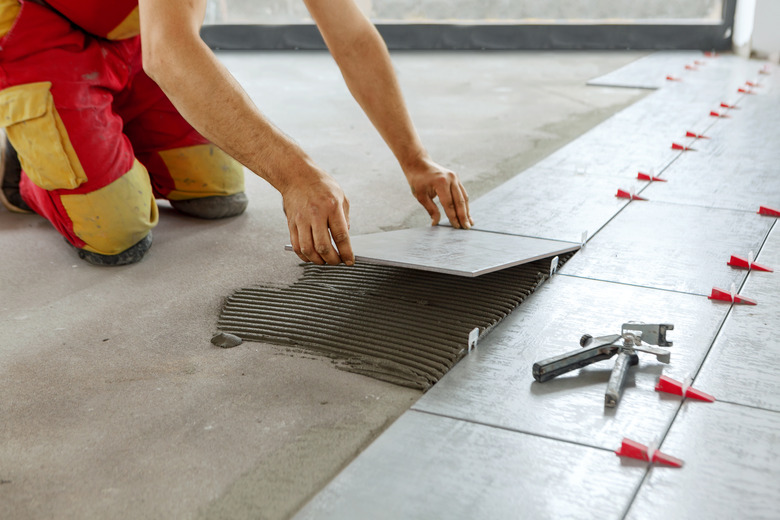Do I Need A General Contractor For My Home Project?
We may receive a commission on purchases made from links.
You can think of a general contractor as the captain of your home remodeling cruise ship — though they aren't physically steering the boat most of the time, they have control over every aspect of the process. For a major home improvement project, that includes scheduling, hiring, supervising, and signing off on the completed project. They also serve as the go-to person when the client has a question or a complaint.
Because they aren't actually doing the heavy lifting of the remodel itself, many homeowners consider taking over the responsibilities of a general contractor themselves. This can save a large amount of money (general contractors make up about 15 to 20 percent of a project's cost), but it can definitely come at a cost — namely, that it's a difficult and time-consuming job that you're not getting paid for.
Weighing the pros and cons of hiring a general contractor for your next project? Here's what to know before you decide.
Tip
Whether or not you need a general contractor for your renovation project depends on the scope of it and on you. The larger and more expensive the project, the more it makes sense to hire a professional to make sure everything goes according to plan. If you have a knack for organization and are willing to endure a steep learning curve, consider managing the project yourself.
Duties of a General Contractor
Duties of a General Contractor
A general contractor turns the homeowner's vision and the designs of a professional architect or designer into reality. There is no hard and fast rule about what type of projects a general contractor takes on, but in most cases, the projects tend to be very large or very complicated, such as a bathroom or kitchen remodel, basement conversions, and room additions, as well as new home construction. In addition to the high costs, those types of projects usually involve many important details and more than a few subcontractors.
The tasks for which a general contractor is responsible include:
- Interpreting the project plans
- Obtaining building permits
- Obtaining proper insurance
- Negotiating building material prices
- Ordering building materials
- Scheduling and accepting delivery of building materials
- Paying for building materials
- Finding and hiring subcontractors
- Scheduling subcontractors
- Supervising the work of subcontractors
- Paying subcontractors
- Scheduling building inspections
- Dealing with job site problems
- Being the point person for questions and complaints from the homeowner
Actual responsibilities will vary from project to project. In some cases, the general contractor is also one of the tradespeople who does some of the actual work.
Should You Hire a General Contractor?
Should You Hire a General Contractor?
When you're trying to decide whether or not to hire a general contractor for your remodeling project, it's best to ask yourself the following questions:
References
What Type of Project Is It?
As a general rule, large, complicated projects — those that will take more than a week or two and will involve multiple subcontractors — should nudge your decision toward hiring a professional general contractor. Big projects involve many moving parts, and general contractors are experienced in dealing with them.
Don't fall into the trap of equating square footage with level of complexity. This is especially true when remodeling a bathroom. It may be a small space when compared with other rooms, but bathroom projects and the building codes that apply to them are very complicated. Relocating a tub or other fixture even a few inches can mean rerouting plumbing and wiring in addition to making changes to the wall and floor finishes.
Do You Know Construction?
It is not necessary to know everything about construction to hire subcontractors for the job, but someone managing an entire project should know how things go together and in what order. Part of a general contractor's job is to schedule delivery of building materials and products and to schedule the subcontractors. For instance, the kitchen cabinets have to be onsite at the same time as the cabinet installer, and the rough plumbing needs to be in place before the drywall subcontractor gets to work.
A lack of knowledge can lead to cost overruns, and overruns will eat into the savings you were hoping to have by not hiring a general contractor. There can be overruns with a general contractor, but a pro can limit mistakes and keep overruns to a minimum.
Are You Organized?
Most bottlenecks and mistakes that occur during a project are the result of poor planning in the beginning, and successful general contractors put in a lot of work mapping out the various steps that make up the project. Because of their experience, they can look at the project plans, recognize potential trouble spots, and think of ways to avoid problems.
Once work starts, the general contractor has to keep everything on schedule. That usually means balancing deliveries, inspections, and subcontractor schedules. Contractors spend a lot of time calling, texting, and emailing suppliers and subcontractors, so good communication is important.
In addition to all of the schedule juggling, there are also responsibilities of a home renovation of which you might not even be aware. For example, contractors typically must buy risk insurance, sometimes called construction insurance. It insures all of the materials and equipment while the project is underway. If you are using a bank loan to finance the project, the bank will probably require it. You will also need liability insurance in the event that someone gets injured on the job.
Can You Work With Suppliers?
An experienced general contractor will have a relationship with building material suppliers, and the contractor will be able to negotiate the best prices for the materials. Suppliers realize that if the contractor is treated fairly, they will be back with more orders in the future. As a one-and-done customer, a supplier will gladly fill your order, but you probably won't get as good of a price as a professional general contractor.
Can You Supervise Subcontractors?
General contractors usually have a list of subcontractors they like to work with. You will have to develop your own list if you serve as your own general contractor. If you start with one good subcontractor, they may know of others you can contact. A good carpenter may know a good electrician and so on. The subcontractors have to be scheduled, and you have to figure out what to do if one does not show up as promised.
As the general contractor, you will also need to inspect the work of the subcontractors. This can get tricky and uncomfortable if you are questioning the work of a professional tradesperson, but sometimes, it is necessary. One possible solution is to hire a construction manager — someone who inspects the work and makes sure it progresses according to plan. This job is often performed by a retired contractor or a knowledgeable friend or relative.
Do You Want the Job?
Being a professional general contractor is a career, and most contractors earn their knowledge and experience through on-the-job training. They have already made their mistakes and dealt with a slew of problems that can arise during a project, and hopefully, they know how to avoid past errors. You probably do not have the same experience, and you will have to deal with a steep learning curve.
That does not mean it can't be done. Many people with little or no experience manage their remodeling projects and learn how to deal with scheduling and working with subcontractors. It usually takes more work and costs more than expected, but there is satisfaction in being the leading member of the team that completes the project.

